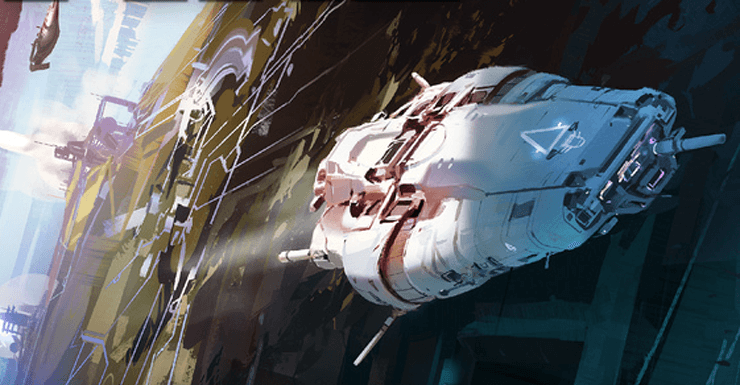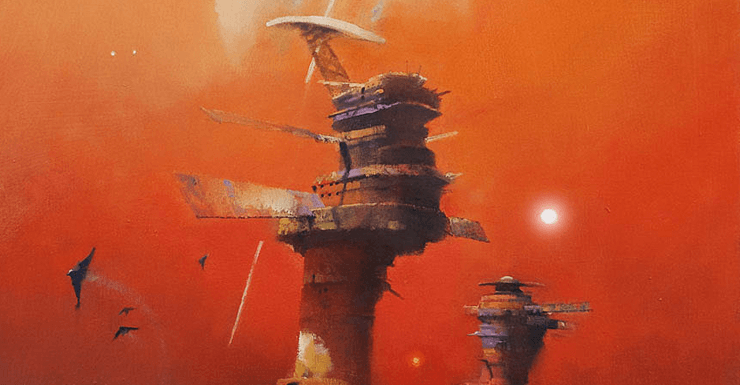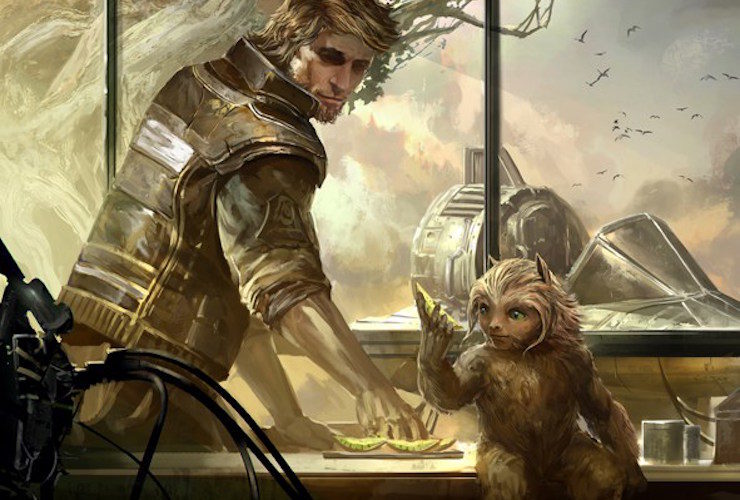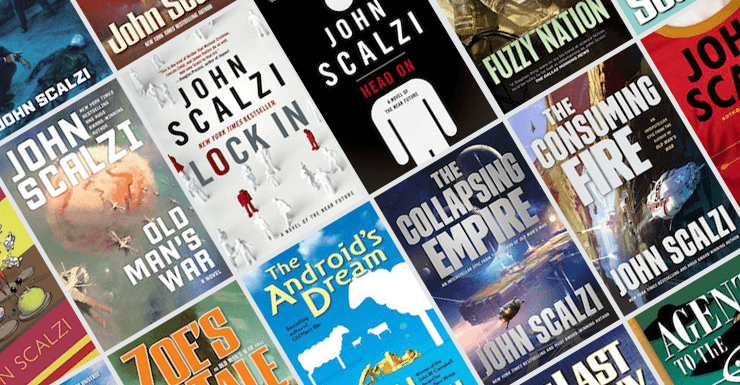Old Man’s War was my first book by John Scalzi, and it would be my gateway back into science fiction and fantasy after years and years skimming along the surface, apathetic about my reading choices and not finding the type of science fiction in literary form that I loved so much in visual mediums. I’m probably not Scalzi’s biggest fan (or AM I?), but I am at least up there in the Hall of Fame with the other people who have handwritten him letters and then mailed them to friends across the country to deliver at book events I couldn’t attend.
I have tons of favorite authors, but there’s something special about finding that first author in whatever your favorite genre is that can tell a story that makes you go, “I want more of this immediately.” After reading Old Man’s War, I devoured all the work by Scalzi that I could afford to buy and then started waiting for him to publish more. He’s been a reliable source of entertainment for years—even years when he doesn’t publish new books, because he writes books that are very re-readable. Let’s not talk about how many times I’ve read The Android’s Dream and how desperately I want another book in that universe. (Unless your name is John Scalzi and you want to tell me all about your plans for the next book. Then we can talk.)
That said, I also think that Scalzi is a complicated person and author who, as he’s grown as a storyteller, has done a lot of experimenting in his fiction that might be opaque or extremely subtle to the eyes of new readers. Because I am an Extreme Scalzi Fan, I’m 100% biased about wanting people to start in certain places, learn his style as an author, and then move on to other, more experimental books. This is self-serving: I want to maximize the number of people I can convert into ways of the Scalziverse.
Wondering where to start? Well, here is a guide to some of John Scalzi’s back catalogue, by me, an Extreme Scalzi Fan:
101: Beginner Scalzi

If you’re brand-new to Scalzi’s work, there a few possible starting places. If you want a comedic space opera adventure, you’ll want to start with Old Man’s War and its companion and sequel novels, The Ghost Brigades and The Last Colony. If you’re in the mood for straight up comedy SF, then Agent to the Stars is your entry point. And if you want some comedy but also kind of want to watch a political thriller in your underwear while eating snack food and don’t know what book could possibly meet all those qualifications at once, there’s The Android’s Dream, which is the funniest/darkest book about sheep I’ve ever read.
I would 100% put The Collapsing Empire and its sequel The Consuming Fire here as a great gateway, especially if you like foul-mouthed women and hipster-ish scientists saving humanity from interstellar calamity. I would call The Collapsing Empire Scalzi’s political space thriller. It’s more drama than comedy, which sets it apart from Old Man’s War, but let’s be real: it’s Scalzi, and he’s a funny guy who writes great character banter. You’re gonna laugh.
Buy the Book


The Consuming Fire
102: Intermediate Scalzi

Here, I’d place the continuations to the Old Man’s War series. If you want to read a novel that revisits that world and characters, but doesn’t start a completely new series with new characters, pick up Zoe’s Tale, which retells the story in The Last Colony from an entirely different perspective. Zoe’s Tale is also one of the novels I would put in Scalzi’s experimental category, where he starts to really grow as an author. The main criticism I’ve seen this novel get generally implies that teenager girls just aren’t this clever. My clapback to that is that you must not know that many teenage girls, and also, you’re wrong. Of all the adult novels featuring young women that I read during the late 2000s, this continues to be one of my favorites.
If you want to stay in the Old Man’s War universe but are hungry for additional adventures that are brand-new, The Human Division and its follow-up, The End of All Things, are your next stop. They get bonus points for being chopped into easily digestible chapters, so if you want something that you can read in bits—something you can put down and easily come back to—these books are it. They were released serially, similar to TV episodes, and they work great in that format, too. But I also think they have more emotional impact when grounded in knowledge of the original series, so my preference is to recommend them after people have read (and hopefully liked—no pressure!) Old Man’s War.
103: Advanced Scalzi

This heading is, admittedly, misleading; I don’t think these titles are inaccessible for new readers at all, and in many cases could be great entry points which would leave the books massively re-readable later on. But I do believe that these books are more experimental and that readers will benefit from being familiar with Scalzi’s style and the politics of his work (which will become clear if you read entries in the 101 and 102 categories first). It’s safe to say that depending on how deeply you read into his books, technically these titles would also work just fine in the 101 section. Since I am a big fan of deep dives into literature, though, I enjoy these books for their subtlety, their undertones, and sometimes, their sneakiness, which I think becomes easier to see and appreciate when you’re more familiar with Scalzi’s narrative habits.
Redshirts is first on this list, and operates best if you have a working knowledge of Star Trek and/or any number of later, badly-written, SFF-related TV series (like, if you wasted years of your life watching Supernatural, for instance, only to be betrayed…not that I’m bitter). It works on a storytelling level if you have that background as a fan, but there are a lot of interesting undertones to the story that you’ll be able to catch if you’ve read Scalzi’s other work first.
Lock In is a fascinating book, and (without getting into spoiler territory) there’s an interesting facet of the novel that might not be immediately noticeable unless you read with a particular mindset—or if your first encounter with the story is via the audiobook. It’s a futuristic political thriller, but it’s also a narrative about disability. Plus, it challenges reader assumptions. So while I know this would work well in the 101 section based on its story alone, I again think that going into it with a firm understanding of Scalzi’s previous work enriches the reading of Lock In and its sequel, Head On.
Extra Credit

Fuzzy Nation is to H. Beam Piper’s Little Fuzzy as the Star Trek reboots are to the original Star Trek. It’s a book that could go in the Advanced Scalzi section, but it’s also so much its own thing that it feels sort of weird to lump it into any specific category. It’s a science fiction adventure novel that builds on long-existing characters and worldbuilding by another author, so really, Fuzzy Nation can be read at any point for a solid introduction to Scalzi’s narrative style.
Obviously, this list doesn’t even cover most of John Scalzi’s work; he’s done audio-first work with The Dispatcher, he’s published a lot of extra content to existing series, plenty of nonfiction, as well as standalone work with Subterranean Press, such as Miniatures. His back catalogue is expansive and rich, and if you like science fiction, there’s a good chance he’s done something you might like if you enjoy anything from the selections above.
Of course, my arbitrary classifications are mine alone—they’re how I approach the process of introducing Scalzi’s work to my friends and acquaintances (calibrated to achieve Maximum Conversion, always!). You may have a different approach—what was the first book by Scalzi you read? Would you start by recommending that book to someone new to Scalzi or SF, or would you go with a different one? Let us know your suggested reading order for Scalzi’s ever-growing body of work!
Orignally published in March 2017.
Renay Williams stumbled into online fandom, fanfiction, and media criticism via Sailor Moon in 1994. Since then, she’s become an editor at Lady Business and a co-host of Fangirl Happy Hour. She can be found having emotions over the lives of fictional characters on Twitter @renay.











Redshirts was my first Scalzi. It would not be my last.
I came to Scalzi as a result of the Tor.com first line game, and how in every single game the first line of Old Man’s War would show up near the top of the list. The Scalzi oeuvre followed.
I find Scalzi to be the funniest – by far – of the contemporary Sci-Fi writers. There are excellent examples on the Tor.com website, including After the Coup (in the Old Man’s War verse) and the epic excerpt from The Shadow War of the Night Dragons Book One: The Dead City.
Redshirts is a standalone and the basic concept is entertaining even for someone who isn’t a deep-dyed ST fan, I think; not a bad place to start.
Old Man’s War comedy? It has some light-hearted moments, and the author is generous with them. There are some smiles. That alone does not make it comedy.
Casablanca is not comedy. Patton is not comedy. More like drama with some comic relief thrown in here and there.
Frasier is comedy. Singing in the Rain is comedy. There, with some drama thrown in to engage the spectator.
See the difference? Better check your dramatic cathegories when recommending books…
I’ve never read him, but Old Man’s War or Redshirts would be my starting point. The advantage to his writing around so many diverse ideas is that the breadth of coverage is likely to have something for everyone who reads SF. He doesn’t seem like someone who repeats himself a lot.
I would add “The God Engines” to Scalzi 301. It’s unlike all the other books on this list in that the mood of the book is dead serious, unlike the light-hearted tone he tends to take. While I’ve enjoyed every single Scalzi book I’ve read, I have to admit “The God Engines” is my favorite.
I’m gonna have to agree with @@.-@, here. The Old Man’s War series may have some comedic moments (the bit where Dirac wakes up for the first time sans Brain Pal and screams in Mattson’s face comes to mind, as well as “Eat the fucking cookie”), but I wouldn’t call it straight up comedic. (See, for reference, the whole mess with the Eneshan Hierarch’s heir from the same book.)
@@.-@, 7. OK, let’s clarify. I didn’t say that Old Man’s War was a comedy. The book and most of the series mixes excellent comedy with serious and even tragic elements (like Patton, one of my favorite movies). I did say that Scalzi is the best comedic writer out there and gave as examples two of his best short works, both available on this site. Redshirts is a very funny novel (although I don’t like it as much as some others do – maybe I’m more Star Wars than Star Trek.) I also view Zoe’s Tale as a largely comic novel although it has obviously serious elements as well. Ditto for Fuzzy Nation, Agent to the Stars and any of the Old Man War universe books featuring Harry in a lead role.
If a friend knows Star Trek, I always suggest red shirts first. If not, then I usually go with Old Man’s War, which I think is one of the most amazing books ever written.
I also think Android’s Dream and Agent to the Stars might be good one-offs for a new reader. First time I read Android’s Dream, I was told huffily by my roommate that I was “Snorting a lot.”
I started with RedShirts. I was hooked. I have to admit that Will Wheaton narrating is amazing. The Collapsing Empire set has been great. I prefer it to the Android’s Dream book. I haven’t made it through the God Engine yet. I guess it comes down to his tone. He adds such a sense of humor to any scene. How many authors would tag a prison shanking in such a humorous way?
I just started with Lock In. I finished the book in a weekend because of how much I really liked the premise of the book. I snagged a copy of The Collapsing Empire while I was looking for more to read by him. I realized my library has almost all of his books. I am excited to binge read his books. This has given me some ideas on what to read next. I can’t wait!
I had read bits and pieces of Your Hate Mail Will Be Graded while working at Barnes and Noble, then forgot all about him until a few years later when I found an autographed copy of Redshirts in the used book bin at my local grocery store and have been hooked ever since!